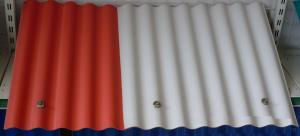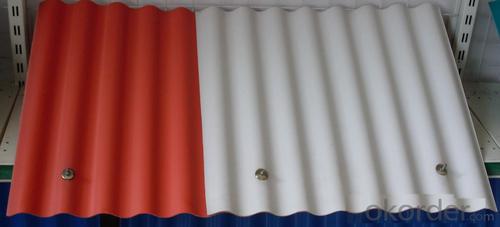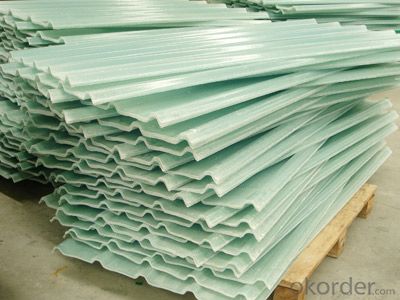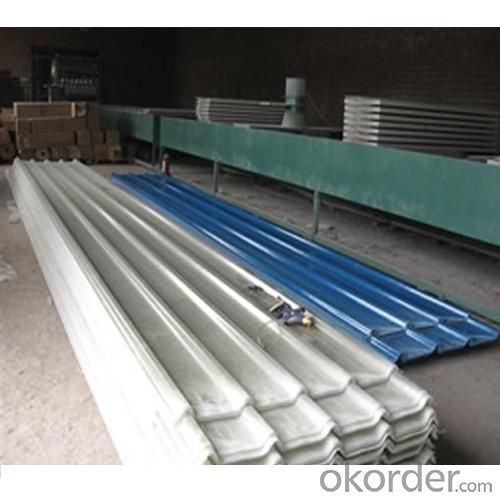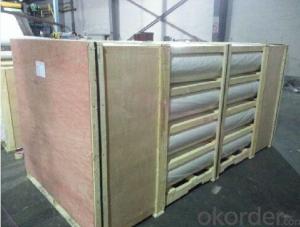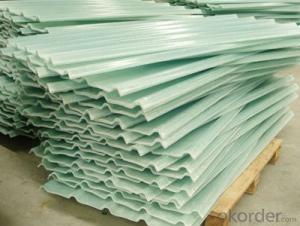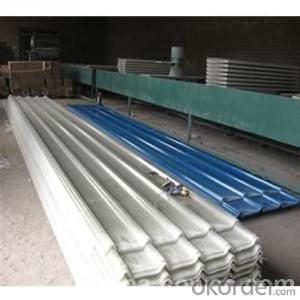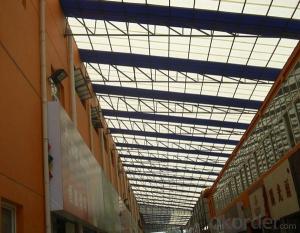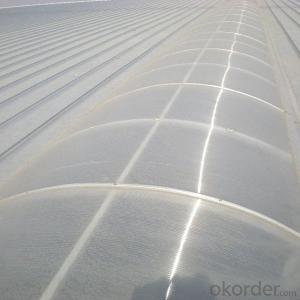Fiberglass Mat Tissue Reinforced Anti-Corrosion & High Strength Roofing Panels for Guard & House
- Loading Port:
- Shanghai
- Payment Terms:
- TT or LC
- Min Order Qty:
- 20000 kg
- Supply Capability:
- 200000 kg/month
OKorder Service Pledge
OKorder Financial Service
You Might Also Like
Anti-corrosion&High Strength Panels(Roofing Panels) Made Of Fiberglass Used in Guard&House
Description
In general, our company specializes in FRP grating, FRP decking, FRP platform and other products of FRP. We have a varity of FRP products sold over the country because we have our own teams of design, manufacturing and sales with hundreds of staffs.
At the same time, we are devoted to creating a production and marketing for FRP products, which has certain influence in China by proceeding with professional teams, rigorous quality management system and advanced production facility.
Today, we’re planning to win more market shares in the world and let more customers know us.
Photos
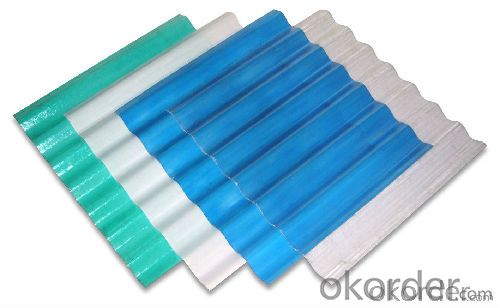
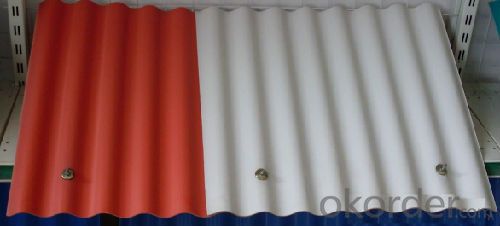
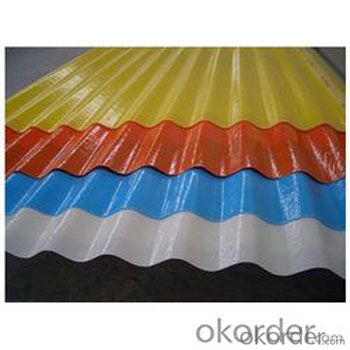
Product Traits
1. Corrosion resistance no rust, no maintenance, long service life.
2. Lightweight, high strength pultrusion process molding FRP profiles have high glass fiber content (60%). In this situation, the density of glass fiber reinforced plastic is only about a quarter of the steel.
3. The intensity and stiffness is quite prominent,.
4. Anti-fatigue high anti- fatigue strength, allowing repeated bending without permanent deformation.
5. Anti-aging select highquality FRP pultrusion profiles, the service life of the product can be more than 20 years.
6. Anti-UV agent are added into all pultrusion FRP profiles get the best anti-uv effect.
Product Advantage
Coated with prevent aging layer
Excellent insulating performance
Easy to maintain.
High strength.
Long service life.
Easy to install.
Good light transmittance.
Application
1)This kind of sandwich panel can be used in large industrial plants,warehouses, supermarkets, hospitals, stadiums, cold storage, activities room, buildings plus layer,
clean workshop and heat insulation fire place.
2) sandwich plate appearance, bright color, good overall effect, it sets the bearing, thermal insulation, fireproof, waterproof in one, and no two decoration, is a widely used, especially in the construction site of the temporary facilities such as office, warehouse, walls, but also embodies the modern construction site civilization construction,
3) in the fast installation and put into use, the assembly and disassembly, material turnover multiplexing index, have obvious advantages, greatly reducing the construction site temporary facilities, will be indispensable new lightweight construction materials
Specification
Unit Weight: 1800g/m² 2400g/m² 3050g/m²
Nominal Thickness:0.8mm,1.0mm, 1.2mm 1.5mm 2.0mm, 2.5mm
Heat Resistance Limit: -60 to +130
Light Transmittance: 75%±2% ( light green) 53%±2% (cream white)
Anti- ultraviolet Rate: 99.9%
Tensile Strength: 100Mpa
Flexural Strength: 180Mpa
Cracking Elongation Rate: 1.9%
Pasture Hardness: ≥50
Thermal Expansion Coefficient: 2.2×10¯125px/cm/
Thermal Conductivity: 0.18w/m° k
FAQ
1.Where do you export to?
A: Our products are very popular in Mid East, India, South East Asia, Latin America, Africa.
2.Q:Can you provide some samples?
A: Yes, of course. We will send you samples for your test berfore you place firm orders.
- Q: How is fiberglass mat tissue used in the production of windshields?
- Fiberglass mat tissue is a crucial component in the production of windshields due to its unique properties and functions. When manufacturing windshields, the fiberglass mat tissue is used as a reinforcement material to enhance the strength and durability of the glass. During the production process, a layer of fiberglass mat tissue is inserted between two layers of glass to create a laminated structure. This layer acts as a barrier, preventing the glass from shattering into small dangerous pieces upon impact. It helps to hold the glass together, providing safety to the vehicle occupants. The fiberglass mat tissue serves as a reinforcing material, improving the mechanical properties of the windshield. It enhances the impact resistance, making the windshield less prone to cracks or chips from stones, debris, or other objects that may hit it while driving. This reinforcement also adds structural integrity to the windshield, allowing it to withstand extreme weather conditions and vibrations without compromising its functionality. Furthermore, the fiberglass mat tissue helps to reduce noise transmission and vibrations. It has sound-damping properties, which contribute to a quieter and more comfortable driving experience by reducing external noise from entering the vehicle cabin. Additionally, the use of fiberglass mat tissue allows for the production of curved windshields. The flexibility of the material enables it to conform to different shapes and contours, allowing manufacturers to create windshields with customized designs and improved aerodynamics. In summary, fiberglass mat tissue plays a vital role in the production of windshields. Its reinforcement properties enhance the strength and impact resistance of the glass, providing safety to the vehicle occupants. It also contributes to a quieter driving experience and enables the production of curved windshields with improved aerodynamics.
- Q: Is fiberglass mat tissue suitable for underground applications?
- Yes, fiberglass mat tissue is suitable for underground applications. It is commonly used in underground construction projects due to its excellent strength, durability, and resistance to water and corrosion. Additionally, fiberglass mat tissue provides insulation and reinforcement, making it ideal for underground applications such as tunnels, basements, and pipelines.
- Q: Is fiberglass mat tissue resistant to pests and insects?
- Yes, fiberglass mat tissue is resistant to pests and insects.
- Q: How does fiberglass mat tissue perform in terms of thermal conductivity?
- Fiberglass mat tissue exhibits excellent thermal conductivity performance. Its fine glass fibers composition contributes to a low thermal conductivity value, resulting in effective heat transfer insulation. The interwoven fibers form a barrier that hinders heat movement, making it a highly suitable material for thermal insulation purposes. Moreover, the mat tissue is frequently combined with binders or coatings to enhance its thermal resistance characteristics. In summary, fiberglass mat tissue is a dependable option for reducing thermal conductivity and delivering insulation across diverse industries and applications.
- Q: Are there any specific certifications or standards that fiberglass mat tissue must meet?
- Yes, there are specific certifications and standards that fiberglass mat tissue must meet in order to ensure its quality and suitability for various applications. One of the most widely recognized standards for fiberglass mat tissue is the ASTM D 4601 standard, which establishes the minimum requirements for glass fiber mats used in roofing and waterproofing systems. This standard covers the physical properties of the mat such as weight, thickness, tensile strength, tear resistance, and water resistance. In addition to ASTM D 4601, there are other certifications and standards that fiberglass mat tissue can be tested against, depending on its intended use. For instance, fiberglass mat tissue used in the automotive industry may need to meet specific standards such as ISO 9001 or IATF 16949, which ensure quality management systems and product consistency. Moreover, fiberglass mat tissue used in construction or building materials may need to comply with standards set by regulatory bodies or organizations such as the International Code Council (ICC), the American National Standards Institute (ANSI), or the Underwriters Laboratories (UL). These standards typically focus on fire resistance, thermal insulation properties, and overall safety. Overall, the specific certifications and standards that fiberglass mat tissue must meet depend on its intended application and the industry in which it is used. These standards play a crucial role in ensuring the quality, performance, and safety of fiberglass mat tissue products.
- Q: How does fiberglass mat tissue enhance the strength of composite materials?
- Fiberglass mat tissue plays a crucial role in enhancing the strength of composite materials. It is a woven fabric made of thin fiberglass strands, which are randomly oriented and bonded together with a resin binder. This unique structure allows the fiberglass mat tissue to provide several key benefits to composite materials. Firstly, the random orientation of the fiberglass strands in the mat tissue helps distribute the stress and load more evenly across the composite material. This means that when a force is applied to the composite, the mat tissue prevents localized stress concentrations, which can lead to cracks or failure. By distributing the stress, the fiberglass mat tissue enhances the overall strength and durability of the composite material. Secondly, the resin binder used in the fiberglass mat tissue acts as a reinforcement and bonding agent. When the composite material is manufactured, the resin binder in the mat tissue infiltrates the fibers, creating a strong and cohesive structure. This not only improves the overall strength of the composite material but also enhances its resistance to impact and fatigue. Furthermore, the presence of the fiberglass strands in the mat tissue increases the stiffness of the composite material. The strands, when combined with the resin binder, create a rigid framework that adds structural integrity to the composite. This increased stiffness makes the material more resistant to deformation and improves its load-bearing capabilities. In addition to strength enhancement, fiberglass mat tissue also provides thermal and electrical insulation properties to composite materials. The fiberglass strands act as a barrier, reducing heat transfer and preventing electrical conductivity. This makes the composite material suitable for applications where insulation is required, such as in electrical enclosures or thermal insulation panels. Overall, fiberglass mat tissue plays a vital role in enhancing the strength of composite materials by distributing stress, reinforcing the structure, increasing stiffness, and providing additional insulation properties. Its random orientation, resin binder, and unique characteristics make it an indispensable component in the production of high-performance composites used in various industries, including aerospace, automotive, construction, and marine.
- Q: How does fiberglass mat tissue perform in terms of dimensional stability?
- Fiberglass mat tissue performs exceptionally well in terms of dimensional stability. Due to its unique composition and manufacturing process, fiberglass mat tissue exhibits minimal shrinkage or expansion when exposed to temperature variations or moisture. This characteristic makes it an ideal material for various applications where dimensional stability is crucial, such as in the construction industry for reinforcing walls, roofs, or floors. The consistent size and shape of fiberglass mat tissue ensure that it maintains its original dimensions over time, providing long-term durability and reliability. Additionally, its dimensional stability allows for precise cutting, shaping, and installation, reducing waste and increasing efficiency in manufacturing processes. Overall, fiberglass mat tissue offers excellent dimensional stability, making it a favored choice in industries where accurate and stable dimensions are vital.
- Q: Is fiberglass mat tissue resistant to UV radiation?
- No, fiberglass mat tissue is not resistant to UV radiation.
- Q: How does the fiber orientation of fiberglass mat tissue affect its strength?
- The strength of fiberglass mat tissue is heavily influenced by the orientation of its fibers. Fiberglass mat tissue is a composite material consisting of glass fibers that are randomly distributed and held together by a binder material. When the fibers are randomly oriented, the material exhibits isotropic strength properties. This means that it has similar mechanical properties, such as tensile strength and stiffness, in all directions. Random fiber orientation provides an even distribution of load-bearing capability throughout the material, making it resistant to both tensile and compressive forces from any direction. Alternatively, when the fibers are oriented in a specific direction, the material becomes anisotropic. This means that it has directional strength properties. In this case, the material is stronger and stiffer along the direction of the fibers, while its strength decreases in other directions perpendicular to the fiber orientation. This anisotropic behavior is due to the fact that the fibers primarily bear the load, while the binder material provides support and cohesion between the fibers. By manipulating the fiber orientation during manufacturing, it is possible to customize the strength and performance characteristics of fiberglass mat tissue for specific applications. For example, in the construction industry, where strength is required in a particular direction for reinforcing concrete, or in the aerospace industry, where structural components need maximum strength along a specific load path, the fibers can be aligned accordingly. In conclusion, the fiber orientation of fiberglass mat tissue directly impacts its strength. Random fiber orientation results in isotropic strength properties, providing balanced strength in all directions. Alternatively, specific fiber alignment creates anisotropic strength properties, allowing for enhanced strength along the direction of the fibers. This ability to control fiber orientation enables the customization of fiberglass mat tissue to meet the specific strength requirements of different industries and applications.
- Q: Can fiberglass mat tissue be used for making lightweight doors?
- Fiberglass mat tissue is a lightweight material commonly used in different industries due to its strength and durability. It consists of thin strands of fiberglass bonded together with a binder, resulting in a flexible and strong material. When utilized in door construction, fiberglass mat tissue offers multiple advantages. Firstly, its lightweight nature makes it perfect for creating doors that are easy to handle and install. This is particularly beneficial in residential or commercial settings where doors are frequently opened and closed. Moreover, fiberglass mat tissue possesses exceptional thermal and acoustic insulation properties. This means that doors made with this material can effectively block out noise and regulate temperature, resulting in a more comfortable and energy-efficient environment. Furthermore, fiberglass mat tissue is highly resistant to moisture, rot, and insects, making it a durable and long-lasting option for door construction. It can withstand harsh weather conditions, making it suitable for both interior and exterior doors. In conclusion, fiberglass mat tissue is a versatile material that can be used to create lightweight doors that offer strength, durability, insulation, and resistance to various environmental factors.
Send your message to us
Fiberglass Mat Tissue Reinforced Anti-Corrosion & High Strength Roofing Panels for Guard & House
- Loading Port:
- Shanghai
- Payment Terms:
- TT or LC
- Min Order Qty:
- 20000 kg
- Supply Capability:
- 200000 kg/month
OKorder Service Pledge
OKorder Financial Service
Similar products
Hot products
Hot Searches
Related keywords
